|
 

Tractate 6 : The Error of Kant (continued)
The list is by no means complete. The list initiates an understanding regarding the application of various forms of the ‘golden rule’ as a form of Categorical Imperative.
Kant could find no Categorical Imperative emerging from his proposed metaphysical system. This is not surprising when perhaps the most universally accepted form of Categorical Imperative, variations of the Golden Rule, itself is fraught with so many pitfalls.
What caused Kant’s failure to find a ‘Categorical Imperative’? Kant did not look far enough ‘outward’ to find his holy grail, the categorical imperative. Kant looked in the only place he understood to exist. Kant looked ‘within’ ‘reality’, looked ‘within’ the physical, looked ‘within’ the Aristotelian metaphysical parameters of the universe and its infinite reach limited by the parameters of infinite time and infinite space.
But space and time appear to be innate characteristics of matter and energy or vice versa. Whichever the case, space and time are ‘bound’ by the limits of their very selves be it finite or infinite.
Kant forgot the meaning of ‘meta-‘ (beyond) ‘physics’ (the physical). As such Kant looked ‘within’ the physical to understand how his concept of ‘active’ verses ‘passive’ observation operated. The understanding of the ‘critical philosophy’ was not to be found by examining the physical, the phenomenal, alone. Nor was it to be found by examining the abstract, the noumenal, alone. The emergence of the first and second Categorical Imperative lay in understanding the interrelationship that existed between the abstract and the physical.
Had Kant understood a rational metaphysical system incorporating two separate and distinct ‘inter’ and ‘intra’ dependent locations of abstractual existence and physical existence, seamlessness and multiplicity, the physical and the non-physical, free will and determinism, Centricism and non-Centricism, …, Kant may have been able to find his dearly beloved categorical imperative.
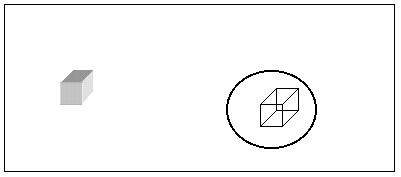
The categorical imperatives, #1 and #2, listed imply an elevation of the journey of ‘knowing’ entities to the level of being ‘divine’ and thus sacred in and of themselves. The masochist should be allowed to be masochistic without fear of being rejected for what one is. Should counseling and assistance be available for them should they desire to change? Of course for that is what emerges naturally from this new metaphysical system, which fuses the Aristotelian, and Kantian systems into one system.
The pedophile, the homophobe, the bigot, the paranoid, the schizophrenic, the religious extremist, the ‘beautiful’, the prostitute, the disfigured, the handicapped, the genius, the rich, the protégée, the strong, the mentally challenged, the happy, the religious, the quadriplegic, the lonely, the strange, the unique thinker, the conformist, the atheist, the individual of color, the individual of the lack of color, should be allowed to be who they are without fear of being rejected.
This metaphysical system of ‘being’ being ‘Being’, in fact, finds its foundation built upon the very concept of diversity and individuality should it be the case that it is the individual, through its own free will, which desires the diversity.
Should counseling and assistance be available for them should they desire to change? Yes, but again it must be stated that the counseling should not be ‘forced’ nor interjected to the extent that the unique form of knowing becomes psychologically programmed into conforming to society’s perception of normality.
Does such a metaphysical system reject the concept of the possible existence of ‘life forms’ existing as ‘a’ unit with awareness of abstractual knowing ‘contained’ within the social colony versus the individual? Absolutely not, for that in itself is diversity.
Hegel’s restatement of the Golden rule as seen by Kant is inappropriate as a categorical imperative. Hegel rephrased the Golden Rule in terms of Kant’s categorical imperative as:
Hegel’s game attempt to emulate Kant ended up with Christ saying, ‘What you can will to be a universal law among men, and also hold as a law for yourself, according to that maxim you should act." (Strathern, Paul, Hegel in 90 Minutes, Ivan R. Dee, Chicago, 1997, p19.)
This is not a ‘universal law’ but rather this is a law of individual desire. This is not a law protecting the uniqueness of individuality but rather a law suppressing the very concept of ‘unique’ individuality, suppressing the very concept of the value of the individual being the individual itself. This is a law reinforcing the concept of conformity for then it becomes the majority, which sets the acceptable behavior of the minority.
What then should the categorical imperative be if not the metaphysical transformation of the Golden Rule?
The understanding of the categorical imperative, which Kant could not find, emerged in Tractate 2: Aristotle and Cartesianism. If we refer back to this tractate we find:
The result:
Responsibilities emerge:
- The first responsibility: to universally protect the ‘right’ of virgin consciousness (one’s self and others equally) to journey unimpeded
- The second responsibility: to journey unimpeded
So how is this any different than that of Hegel’s Kantian version of the Golden Rule?
These two categorical imperatives (listed in priority of importance) protects the rights of
The pedophile, the homophobe, the bigot, the paranoid, the schizophrenic, the religious extremist, the ‘beautiful’, prostitute, the disfigured, the handicapped, genius, the rich, the protégée, the strong, the mentally challenged, the happy, the religious, the quadriplegic, the lonely, the strange, the unique thinker, the conformist, the atheist, the individual of color, the individual of the lack of color, …
But how can this be without throwing society into a quagmire of unique expressions constantly infringing upon the rights of others through the desire of the first party to superimpose its wishes upon the second party.
That is exactly why the order of the two categorical imperatives are listed in the order they are. The first categorical imperative supercedes one’s longing to impose one’s personal desires upon a second party and the second categorical imperative expresses your ‘right’ to be who you are as long as you don’t interfere with the rights of others to be who they are.
As an example, a rapist may have the desire to dominate another in a violent physical fashion but they should not be allowed to do so with anyone not wishing to have such action imposed upon them. Likewise they should not be allowed to do so in a fashion, which pollutes any sensual environment of another who does not wish to be exposed to such actions. The sensual environment includes any form of sounds, visuals, etc introduced into the environment known as the public domain: parks, airwaves, written medium, electromagnetic wave media, …
Categorical imperative number one would emphatically state that telling someone to: Turn off the TV if they don’t like what they see’, would now become, ‘You have no ‘right’ to infringe upon my journey by putting me in the position of having to monitor what I might see, hear, taste, smell, or feel coming into my home.’
What then of polluters of the public air, water, and lands. Such polluters would need to clean up their act. Pollution would become an act against the first categorical imperative. Granted, the absolute elimination of pollution is a utopian idea but the concept of working towards such a level of cleanliness found within the home, the environment, within which we live, is not. Pragmatism would need to be balanced against both categorical imperatives.
Kant’s presumed categorical imperative in essence was not the first categorical imperative but rather a description of categorical imperatives. With the development of the first and second categorical imperatives we can make an interesting application to what is perhaps one of the most significant historical documents regarding the significance of individual units of knowing:
When, in the course of events of 'beings', it becomes necessary for one group of ‘beings’ to dissolve the political bands which have connected them with another, and to assume, among the powers of the universe, the separate and equal station to which the laws of nature and of nature's God entitle them, a decent respect to the opinions of ‘beings’ requires that they should declare the causes which impel them to the separation.
We hold these truths to be self-evident, that all ‘beings’ are created equal: that they are endowed by their Creator with certain unalienable rights; that among these are life, liberty, and the pursuit of happiness. That, to secure these rights, governments are instituted among ‘beings’, deriving their just powers from the consent of the governed: that, whenever any form of government becomes destructive of these ends, it is the right of the’ beings’ to alter or to abolish it, and to institute a new government, laying its foundation on such principles, and organizing its powers in such form, as to them shall seem most likely to effect their safety and happiness. Prudence, indeed, will dictate that governments long established should not be changed for light and transient causes; and, accordingly, all experience hath shown, that ‘beings’ are more disposed to suffer, while evils are sufferable, than to right themselves by abolishing the forms to which they are accustomed...'
The Declaration of Independence - Thomas Jefferson
A Declaration
by
the Representatives
of
the United States of America
in
Congress
Assembled.
July 4, 1776
The concept of ‘men’ was not replaced with the term ‘being’ for the purpose of present day ‘political correctness’. The term ‘men’ was replaced with the term ‘being’ because it is Kant with whom we are dealing in this tractate. It is metaphysics and categorical imperatives with which we are dealing. As such:
Categorical imperatives reach to the very ends of the universe itself and as such categorical imperatives must apply not only to humanity but to all unique units capable of abstractual knowing found throughout the entire universe as opposed to unique units capable of abstractual knowing found within our solar system.
In fact the last sentence must be restated to read:
Categorical imperatives reach to the very ends of all universes and as such categorical imperatives must apply not only to humanity but to all unique units capable of abstractual knowing found throughout all universes as opposed to unique units capable of abstractual knowing found within our solar system.
And so it is, under a metaphysical system of 'symbiotic panentheism', a document from 1776 becomes a statement of 'inalienable right's for all 'beings' not just men. And so it is we are better prepared for the future than we had ever anticipated we could possibly become. So it is we but need look to 'basic truths', look to a basic system of metaphysics, to find a foundation we can place beneath our perceptions regarding the significance of the individual we have already established within society.
And who will benefit from the action of establishing a universal understanding based initially upon the individual first and society second as opposed to a system of society first and the individual second. The beneficiary of such a metaphysical system would be either mankind or the first beings we encounter as we spread our influence into the near and eventually far reaches of space. But which of the two will it be? Why, it will be the ‘weaker’ of the two. If for no other reason than pure selfishness, we need to prepare for just such an event for we may find ourselves to be the ‘weaker’ of the two.
Let us never forget, it is, probability speaking, inevitable that we shall someday be the 'weaker of the two'. Therefore, it is inevitable that we would one day be the beneficiaries of having established just such an unselfish metaphysical system.
We can now begin to understand ‘why’ the two categorical imperatives are listed as they are:
- The first responsibility:
To universally protect the ‘right’ of virgin consciousness (one’s self and others equally) to journey unimpeded
- The second responsibility:
To journey unimpeded
Morality versus categorical imperatives
The issue of categorical imperatives is neither a direct issue of ethics nor a direct issue of morality. Rather the issue of categorical imperatives is an indirect issue of ethics and morality.
Categorical imperatives lay the foundation upon which guidelines for ethics and morality emerge. Concepts of ‘good’ and ‘evil’, ‘bad’ and ‘good’, ‘socially acceptable’ and ‘socially unacceptable’ emerge from ontological perceptions, which in turn emerge from metaphysical perceptions, which in turn emerge from metaphysical systems.
Presently western society has simultaneously in place two metaphysical systems: an Aristotelian metaphysical system and a Kantian metaphysical system.
The two contradicting models create complex contradicting social paradoxes as opposed to creating simple social paradoxes. The result: The creation of the Gordian Knot of social dilemmas.
The two systems are different in that the Aristotelian system is a Cartesian/closed system filled with passive action – the observer does not change the event being observed simply through the act of observation itself:
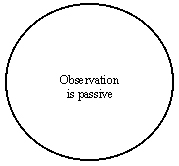
And the Kantian system is a Cartesian/closed system filled with active action – the observer changes the event being observed simply through the act of observation itself:
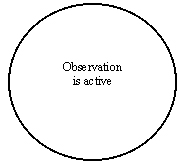
Both systems are the same in that action is ‘contained’ within a Cartesian/closed system. The system is reality/the universe.
Hegel suggested the Kantian system is non-Cartesian/open:
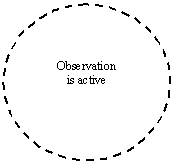
Which brings us back to Zeno’s perception of the metaphysical system. Even so the system is the system and the universe is the system be it open, closed, active, passive...
The new system being suggested as the basis of this work suggests that the more accurate metaphysical system is a combination of all of the above and as such becomes a Cartesian/closed system of active action contained within a non-Cartesian/open system of passive action:
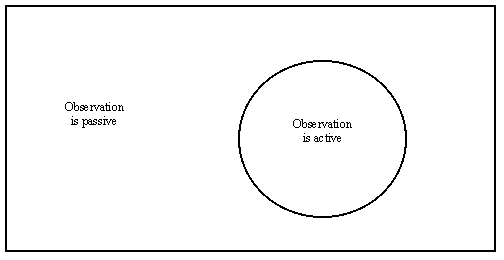
The new metaphysical system suggests that we are the observers:
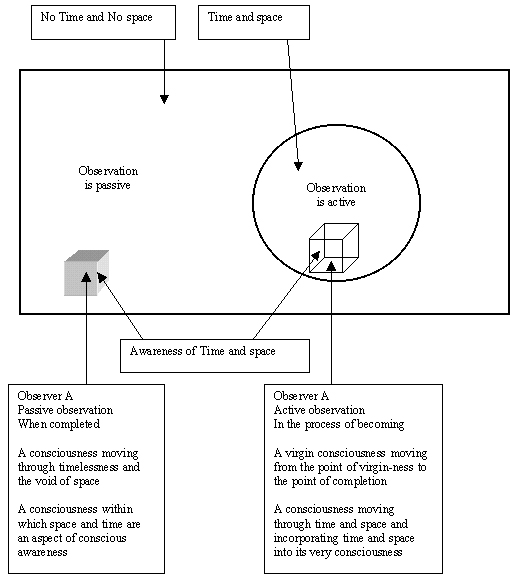
But what does this have to do with ethics and morality. It has nothing to do with ethics and morality and that is just the point. Categorical imperatives pertain to this metaphysical system and the concept of morality and ethics has nothing to do with this system since the system deals only with ‘what was’, ‘what is’, and ‘what will be’. ‘What was’, ‘what is’, and ‘what will be’ ‘is’ the system and ‘what could be’ becomes the process of action within the system. ‘What could be’ is the means by which the system becomes active verses ‘what was’, ‘what is’, and ‘what will be’ being the passive aspect of the system.
Thus the passive and the active exist within the system and are separate aspects of the system. But wouldn’t this imply the passive is more significant to the system since it involves three, the past, the present, and the unavoidable future, versus one, the potential future, form of action?
The present does not exist. The term ‘exist’ implies passivity for the term implies fulfillment and completion of the entity, which is a form of passivity, a form of the past. Yet one cannot say the present ‘will exist’ for that implies a form of the active, a form of the future, a form of continual grow within the framework of future time and time is not a universal fabric found equally distributed throughout ‘whole’ the system.
The present is of such short duration it is simply ‘a’ point fusing the past and the future together as an entity of wholeness, allowing a means of distinguishing the past from the future and just as ‘a’ point in geometry has no dimensions, no length, no width, no height no time elements and thus does not exist, so the present not only has no element of time but has no passive and no active forms of action.
So it is that in the metaphysical system of ‘being’ being ‘Being’, the present becomes ‘the’ system since it is the system of ‘being’ being ‘Being’ wherein the past and the future exist as separate elements of the system completely separate and independent yet dependent one upon the other. So it is the system of the present becomes the means whereby our present day perception of separation through exclusion becomes a new tool of social interaction versus our present day tool of separation through exclusion.
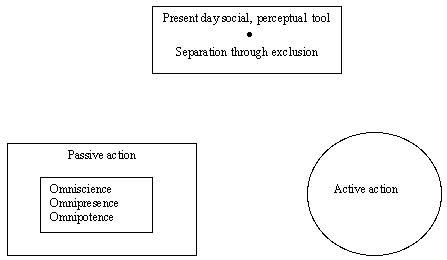
As such we see the diagram becomes:
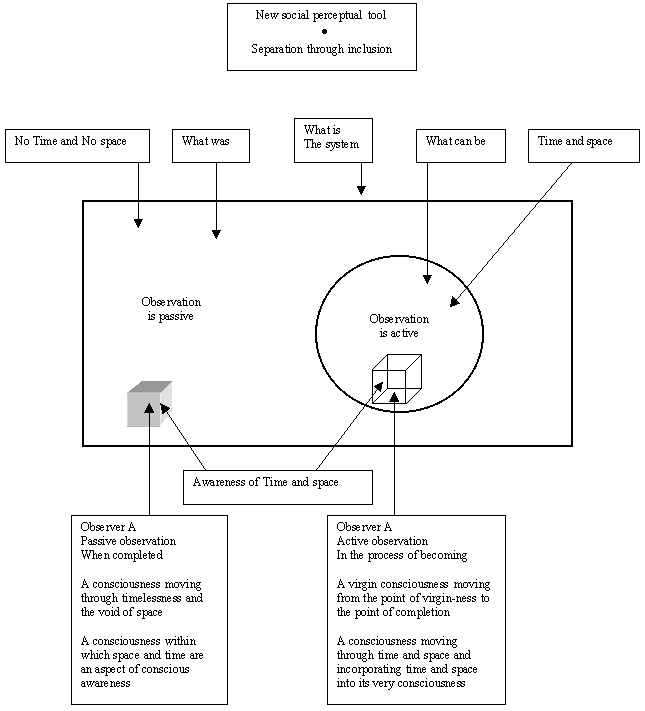
In terms of metaphysics, there is nothing ethical or moral regarding the past for the past is passive. The past cannot be changed. Morality and ethics apply to action, active action, action one is in the process of taking. Since the present does not exist, morality and ethics apply to future actions.
There is no doubt one can look to the past and ‘judge’ the action but regardless of how closely one examines the past one cannot change the past. Thus the past finds no morality or ethics to apply to it. Where then do ethics and morality apply and where do categorical imperatives apply?
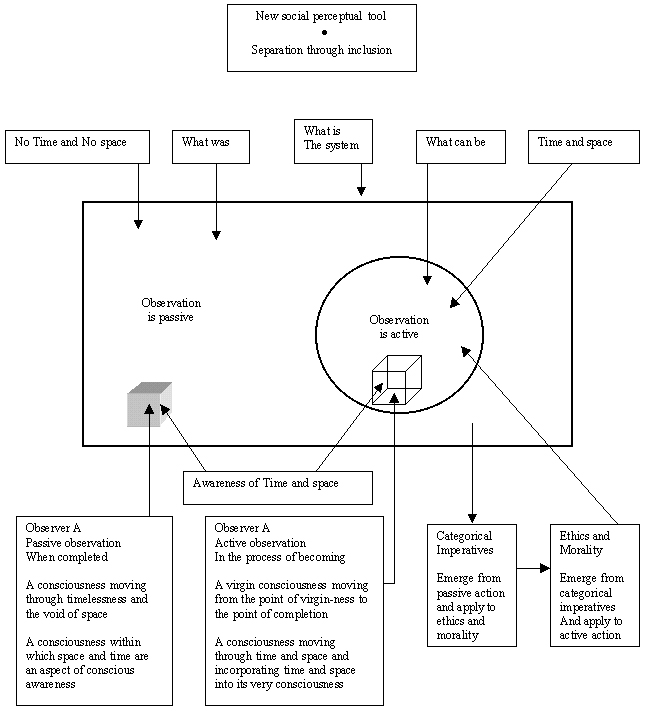
Where then does ‘what will be’ come into this scenario? "What ‘will’ be" ‘will’ be and as such there is no preventing "what ‘will’ be". As such ‘what will be’ simply falls into the category of ‘what was’ since it is a form of passive action versus active action.
Such being the case it would appear that ethics and morality do not face off against categorical imperatives but rather work in conjunction with categorical imperatives.
In terms of the new metaphysical system of ‘being’ being ‘Being’, in terms of an open/non-Cartesian system powered by a closed/Cartesian system located ‘within’ the open/non-Cartesian system that is correct. In such a system there is a harmony of cooperativeness. In such a system metaphysics lays the groundwork, establishes the system from which ontology emerges to establish morality and ethics.
We now understand that:
Kant is a vital link in moving our perceptual understanding forward regarding the ‘system’ being filled with the ‘knowable’ into that of being ‘the’ system filled with both the ‘knowable’ and the ‘unknowable’. As such, the ‘knowable’ and the ‘knowable’, with the help of Kant, now have a location within which they can be found. And now, the understanding regarding the role of both the ‘knowable’ and the ‘unknowable’ as well as the understanding regarding the interrelationship between the ‘knowable’ and the ‘unknowable’ no longer remains in a state of confusion. Even more interestingly, the existence of such an interrelationship is not only recognized, as a significant aspect of the ‘larger’ system but it is now understood as to how such an interrelationship interacts one with the other.
|
|
|











